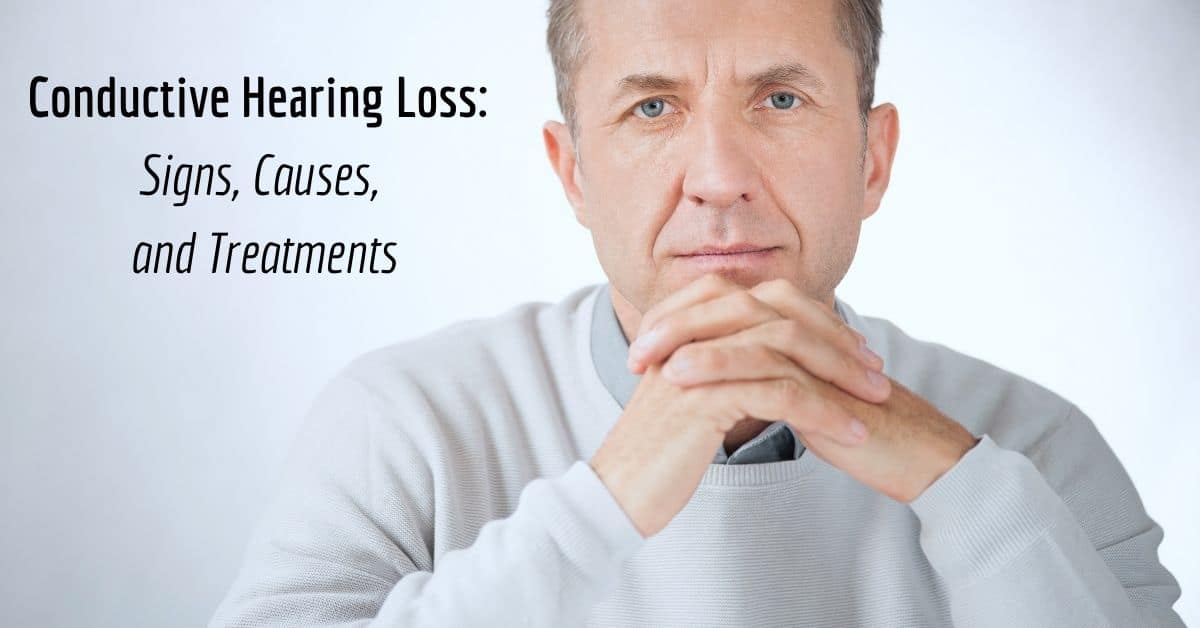- Why You Shouldn’t Do Anything With Your Earwax - April 22, 2024
- Travel Tips for People with Cochlear Implants - April 7, 2024
- How To Have A Great Conversation With People With Hearing Loss - March 22, 2024
When you think of hearing loss the first thing that might come to mind is the loss associated with growing older. Indeed, most people who are fortunate enough to reach the golden years of life will have some degree of age-related hearing loss. Although our minds naturally gravitate to this common form of hearing loss, another major type is not limited to the aging process: conductive hearing loss. This form is localized in the pathway leading to the inner ear, and a person can experience it at any phase of life. Let’s take this opportunity to learn more about the signs of conductive hearing loss, the major causes, and possible treatments.
Signs of Conductive Hearing Loss
Some of the common symptoms of conductive hearing loss give us clues to the underlying causes. The most common experience of conductive hearing loss is a muffled or muted sound in the ears. Some describe this as a stuffy or “full” sensation or sound in the ear canal. Another way to think about this same experience is to say that the sound of one’s own voice is abnormally loud relative to the rest of the world. In addition to this common response, others find a sudden or steady loss of hearing ability, or pain or tenderness in the ear. With these effects on equilibrium, many people feel dizzy or have dizzy spells with conductive hearing loss. Finally, drainage from the ears can be a common sign of the condition.
Causes of Conductive Hearing Loss
As we now know, conductive hearing loss is localized in the outer or middle ear along the pathway leading to the sensitive, tiny hairlike cells of the cochlea. Many problems can occur between the outer ear and that sensitive inner location. The most common cause of conductive hearing loss is earwax buildup. Simply by accumulating that waxy buildup in the ear canal, sound can become muted or muffled. Other causes are related to infections.
Ear infections such as swimmer’s ear can lead to fluid buildup or bacterial residue in the sensitive components of the ear canal. Foreign bodies or debris can become lodged in the ear canal, as well, not limited to fluid but also dust, dirt, sand, or inorganic objects. These foreign bodies can also cause damage to the eardrum or other component of the middle ear, including three important bones. Of course, serious injuries can cause conductive hearing loss, as well. Whether they cause damage to the outer ear or the component features of the middle ear, these injuries can make it impossible for sound to transmit through the pathway to the inner ear.
Treatments for Conductive Hearing Loss
The treatments for conductive hearing loss are as unique as the causes. These conditions often require a visit to an Ear, Nose, and Throat (ENT) doctor, or otolaryngologist. This health care provider will likely start with a consultation and hearing test to determine the degree of damage you have incurred.
If the cause is bacterial or due to an infection, then antibiotics may do the trick to resolve conductive hearing loss. If damage or injury to the ear is to blame, then surgery may be necessary in some circumstances. Earwax buildup or unusual drainage may be the easiest to resolve, though they can come back in the future and may require a new regimen of cleaning and assistance.
One of the other major treatments for conductive hearing loss is the fitting and dispensation of hearing aids. For those who have experienced irreparable damage to the outer or middle ear, hearing aids may be the best solution, making it possible to hear more clearly in the context of that damage.
Though pursuing a path toward resolving the underlying issue is a good parallel path of treatment, many health professionals will recommend hearing aids while the structure of the ear is treated and healed. Hearing aids can be remarkably effective at resolving the muffled or muted sound that many people with conductive hearing loss experience.

